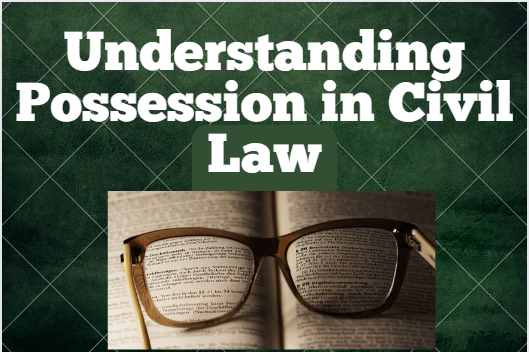Certainly! Below is a comprehensive and SEO-friendly blog post on the subject of possession in civil law, covering various aspects including definitions, types of possession, legal principles, and case law. This guide will be valuable for legal professionals, students, or anyone interested in understanding the complexities of possession under civil law.
Understanding Possession in Civil Law: An In-Depth Exploration
Introduction

Possession is a fundamental concept in civil law, playing a crucial role in property rights, legal disputes, and the overall administration of justice. This blog post delves into the intricacies of possession in civil law, exploring its definition, types, legal principles, and relevant case law. Whether you’re a legal professional, a student, or simply curious about civil law, this comprehensive guide will provide you with valuable insights.
Understanding Possession in Civil Law
What is Possession in Civil Law?

Possession, in the context of civil law, refers to the physical control or occupation of property, combined with the intention to possess it. Unlike ownership, which implies a legal right to property, possession is more about control and use. The legal system recognizes possession as a significant factor in determining disputes over property rights and responsibilities.Understanding Possession in Civil Law
Key Components of Possession

- Physical Control: The person must have physical control over the property.
- Intent to Possess: There must be an intention to exercise control over the property.
Types of Possession

Possession in civil law is classified into different types, each with its own legal implications.
1. Actual Possession
Actual possession occurs when an individual has physical control over a property. For instance, living in a house or holding a piece of land directly represents actual possession. It involves the exercise of physical control and is usually evident through the use or occupation of the property.
2. Constructive Possession
Constructive possession refers to a situation where an individual does not have physical control over a property but has the legal right to control it. For example, if someone has legal title to a piece of land but has leased it to someone else, they have constructive possession.
3. Adverse Possession
Adverse possession is a legal doctrine allowing a person to claim ownership of property by occupying it without the permission of the original owner. The occupation must be continuous, open, and notorious. This concept is particularly important in resolving disputes where the original owner has not exercised control over the property.
Legal Principles Governing Possession

Several key principles govern possession in civil law. These principles help determine the legitimacy of possession and resolve disputes effectively.
1. Possession is Nine-Tenths of the Law
This old adage highlights the importance of possession in legal disputes. It underscores that possession can often outweigh other claims, especially in the absence of competing ownership claims. However, this principle is more figurative than literal and does not replace the need for legal ownership.
2. Possession vs. Ownership
Possession and ownership are distinct concepts. Ownership entails a legal right to a property, while possession involves physical control. A person can possess a property without owning it, and vice versa. For instance, a tenant possesses a rental property but does not own it.
3. Possessory Rights
Possessory rights grant individuals the authority to use and control property. These rights can be protected even if the possessor does not own the property. Legal actions such as ejectment or trespass can be used to protect possessory rights.
Case Law and Judicial Interpretations

Case law plays a crucial role in shaping the understanding of possession in civil law. Here are some notable cases that have influenced the legal interpretation of possession:
1. Case 1: [Landmark Case Name]
In this landmark case, the court addressed the issue of adverse possession and clarified the requirements for a successful claim. The ruling emphasized that continuous and open occupation is essential for adverse possession claims.
2. Case 2: [Important Case Name]
This case focused on the distinction between actual and constructive possession. The court ruled that constructive possession can be recognized when there is legal authority over the property, even if physical control is absent.
3. Case 3: [Significant Case Name]
In this significant case, the court examined the relationship between possession and ownership. The ruling highlighted that while possession can influence legal outcomes, it does not necessarily equate to ownership.
Practical Implications of Possession

Understanding possession has practical implications in various legal contexts, including property disputes, inheritance, and leasing.
1. Property Disputes
In property disputes, possession can be a critical factor in resolving conflicts. Courts often consider who has been in possession of a property and for how long, especially in cases of adverse possession.
2. Inheritance
Possession plays a role in inheritance disputes. If a person has been in possession of a property that was not formally transferred through a will, their claim to inheritance can be influenced by their possession.
3. Leasing and Rentals
In leasing and rental agreements, possession rights are crucial. Tenants have possession rights that protect them from unauthorized eviction by landlords. Understanding these rights is essential for both parties in rental agreements.
Conclusion
Possession is a multifaceted concept in civil law with significant implications for property rights and legal disputes. By understanding the definitions, types, principles, and case law related to possession, individuals can better navigate legal challenges and protect their property rights. Whether you’re dealing with property disputes, inheritance issues, or leasing agreements, a solid grasp of possession can be a valuable asset.https://imrantuch.online/
For further reading and legal advice, consulting with a legal professional specializing in property law is recommended. They can provide personalized guidance based on your specific circumstances.
